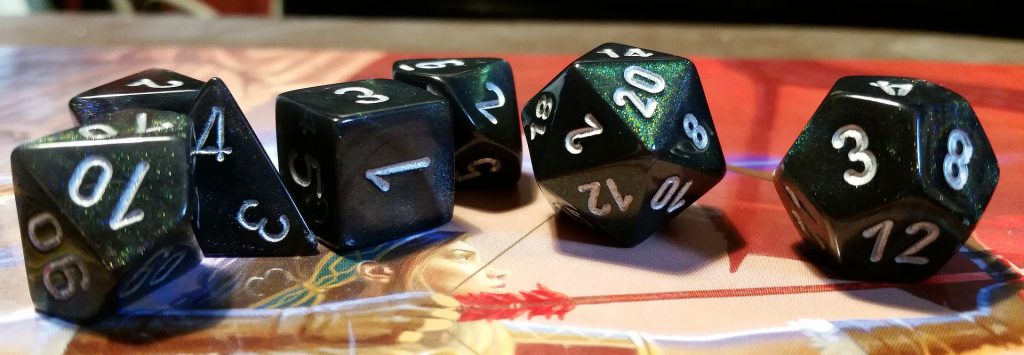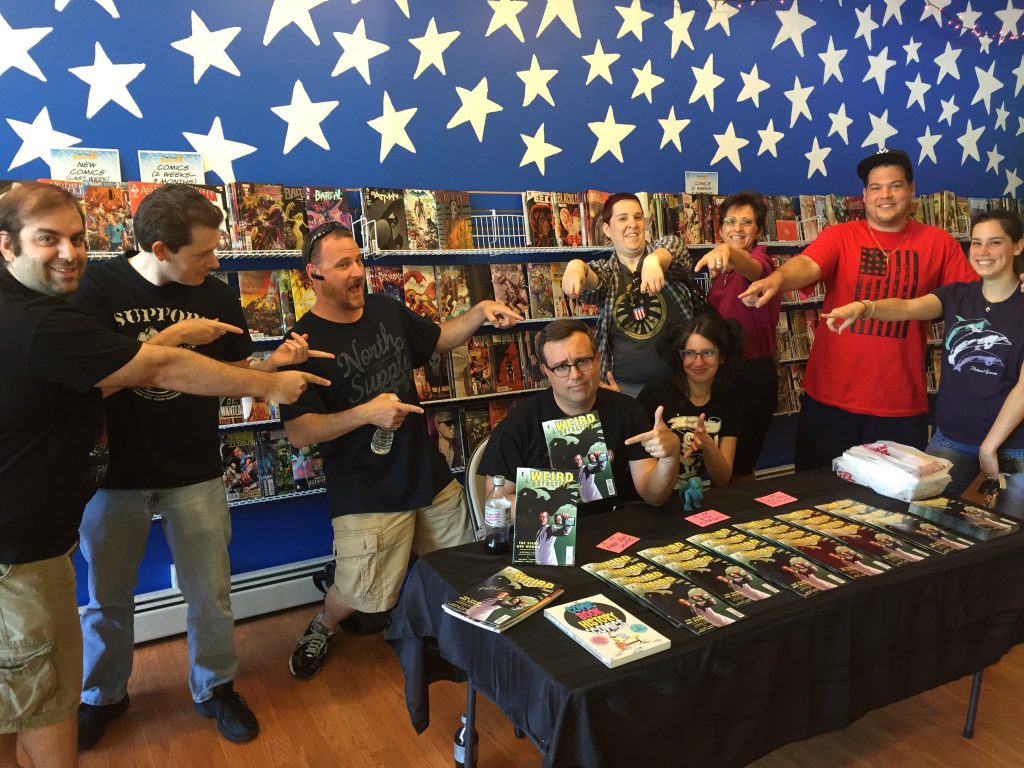Getting Started with RPGs
So, you want to start playing an RPG. First of all: welcome!
RPGs have immense creative power, the capacity to bring people together from all walks of life, and even include badassery like slaying orcs, curing diseases, solving riddles, and finding treasure. They’re the best.
But how do you get started as a first-timer? No worries, we’ve got your back! Here are a few tips to keep in mind as you start:
- Getting Started with RPGs
- A Brief History of Tabletop Role-Playing Games: 5 of the Big Ones
- Benefits of Playing (Especially as an Adult)
- What Type of RPG Player Are You (Based on Reading Habits)?
Getting Started with RPGs

It’s okay to be picky about who you play with.
There are lots of cool people in the world, but you might not enjoy playing tabletop RPGs with all of them. Let’s go over that again, because it’s worth repeating: you don’t have to like playing tabletop RPGs with everyone, even if you like them as people! Try out playing games with different people, and know going in that this might not be your forever-gaming group. You never have to feel forced to play with anyone, or like their way is the only way. In fact, plenty of people play online through Discord and Roll20 when they don't have a network of local gamers. There really is no limit to how many different people and play styles you can connect with through games.
It’s great to get an idea of what you’re interested in doing, and share that with others.
Some folks want to play a group of badasses travelling from town to town killing monsters and looting (a character type lovingly referred to as Murder Hobos in many circles). This is okay. Some people want to play sweet games of flirting intrigue with wholesome romance at the core. This is also okay. The main thing to consider as you’re hoping to start or join a game is this: does this game sound like fun? If it does, then it’s worth trying. You can always try something else if it's not for you!
Try something small-scale first, like guest playing or one-shot games.
On-going, high-commitment gaming isn't the only option, nor its it the best option for a lot of first-time players! If you’re interested in joining a game, ask the game master if you can "guest" in a game session one night. That way you can try out playing with the group before committing to a longer game. Alternatively, you could arrange to play a "one-shot" game with the group you've chosen. A one-shot game is a simpler adventure that it's written to be played to completion in a single session, generally about 4 or 5 hours.
Build your first character the easy way.
Whatever gaming system you choose to use, there is almost always a quick-build option for characters. This is a wonderful way to get started! You just need a general idea of what you want to do and a quick start guide to help you through it. Ideally the game master for your game could help you through character construction, but if they’re busy and can’t lend a hand, YouTube is your friend!
Try watching games (if that’s your thing).
We live in a golden age of RPGs right now, and one of the best things about it are the readily available streams and podcasts sharing gaming with the world. Streams like Critical Role, and podcasts like The Adventure Zone or The Dungeon Rats can make it easier to get to know a game like Dungeons & Dragons outside of the context of actually playing. If you want to know more about a certain game, it’s always worth checking out some of the actual-play content out there about it to see if you enjoy them.
Speak up if you’re ever confused or uncomfortable.
It might feel awkward at first, but you’ll learn much more if you speak up when you have a question or when something about the situation makes you uncomfortable. It's always a much better game when everyone feels they are free to build a good experience together. Ideally your game master is a great person to go to if something at the table makes you uneasy. And if it can’t be worked out? It’s 100% okay to respectfully walk away.
The short version of all these tips? Like we said before, there’s no wrong way to play, so long as everyone feels safe and has fun. There are games full of adorable monsters (shout out to flumpfs and skittermanders), games all about puzzles and riddles, games organized around crushing the patriarchy and games about crawling through dungeons filled with traps. There are players who love backstories or romance or in-depth descriptions or just wanna hit their enemies with a big stick. The quickest way to find out what you love about RPGs? It’s just a roll of the dice away…
A Brief History of Tabletop Role-Playing Games: 5 of the Big Ones

Interested in tabletop role-playing games (or RPGs/TTRPGs), but want to know more about their backstories before diving in? Who could blame you! Here’s just a little bit of history on the publishing and playing of some of the top RPGs we know and love.
Dungeons & Dragons
One of the most easily recognized gaming systems in the world, Dungeons & Dragons was first published in 1974, though the collaborations that brought D&D to life originated several years through Gary Gygax and David Arneson’s shared love of wargaming systems. The two met at the second-ever, now-famous Geneva Convention (or GenCon) in 1971, and discussed possible collaborations on rules. Over the next three years through work with Don Kaye and Jeff Perren, the game began to take shape, so that in ‘74 when it was published, the hand-assembled kits of 3 adventure booklets each sold out in under 11 months. Years later the Monster Manual, Player’s Handbook, and Dungeon Master’s Guide hardcover books would all be published, supporting the worldwide adoption and enjoyment of the game. Since then, 2nd (1982, and the fans went wild) 3rd (2000, and we just call it D&D now, no "Advanced D&D") 3.5 (2005, we do halves now?) 4th (2008, it’s really great if you love World of Warcraft) and 5th (2014, and the newest incarnation to date) editions of D&D have been released. While each contain differences in gameplay, rules, and settings, the game is still what it always has been: a rich fantasy world where you get to build the adventure.
With the recent edition, Wizards of the Coast (the company at the helm of D&D and Magic the Gathering) has taken dramatic steps toward greater inclusion and representation in D&D. 5e leans heavily on storytelling, role playing, and group creativity, making it easier to pick up without a deep knowledge of rules systems.
For a more detailed timeline of the history of D&D, check out this page.
Pathfinder
A little newer to the scene than D&D but still a massively popular game, Pathfinder was born out of collaborations (and some disagreements) between Paizo Publishing and Wizards of the Coast during the period between D&D 3.5 and 4th edition. As lead designer Jason Bulmahn remarked to Polygon, "I said, ‘I kind of have a half-written RPG. We could publish that!’ And a week later I was a lead designer of the Pathfinder Roleplaying Game." It was a dicey move to be sure (pun 100% intended), but one that ultimately payed off for players. Pre-orders sold out the first printing before the creators had copies in-hand! There were a lot of similarities between that first edition of Pathfinder and D&D 3.5, but over the years the game has fully come into its own as a separate system to be loved and enjoyed.
Most recently, Paizo has expanded in two very exciting ways for players who love their gameplay system: in 2017, they unveiled their space adventure RPG Starfinder at GenCon, and at that same convention in 20918 they hosted a play test for Pathfinder 2.0, the next edition of their core system. It’s a very exciting time to be a pathfinder player, head over here for more updates on their work.
Vampire: The Masquerade
While other games on this list took care to reach out to the younger audience, Vampire the Masquerade elected to appeal to more adult dark themes. Vampire is arguably the best-known system in the World of Darkness, though the setting includes modules for Werewolves, Mages, Hunters, Changelings, and many others. The brain-child (or would brain-thrall be more appropriate?) of Mark Rein-Hagen, the team at White Wolf, and Tom Dowd’s game-mechanics-designing know-how, Vampire the Masquerade was first published in 1991. Since then it has been adored by fans of its dark, neo-gothic urban fantasy world. One of the other differences between this system and some of the others in this list is that the World of Darkness is constructed in the modern day real world – that when you play a vampire or a werewolf, you’re playing one who knows about (or could at least choose to know about) computers and fast food.
In 2004, the designers helming the World of Darkness stopped releasing new content for the so-called Old World of Darkness, instead focusing on the Chronicles of Darkness (or New World of Darkness), including Vampire: The Requiem, published through Onyx Path Publishing. The rules system was streamlined, and while the release met with some controversy, both New and Old World of Darkness games are still played and bring neo-gothic horror joy to any who seek them out.
This year the team released Vampire: The Masquerade 5th Edition, lead by Kenneth Hite, which should excite preternatural players from all over the world. Vampire has been re-interpreted as a video game and is also played as a LARP (live action role play) game, so if you want to expand beyond the tabletop itself, there’s always freedom to do so!
Call of Cthulhu
Chances are, if you know who/what Cthulhu is, then you know exactly what you’re in for with this game — if not, then buckle up! Call of Cthulhu is a horror-focused RPG featuring Chaosium’s basic RPG rules paired with the brain-bending Cthulhu mythos. While many of the other games listed here provide the opportunity to be a super-powered character capable of great deeds, Call of Cthulhu reverses this idea, ensuring that players are outclassed by the threats they face at every turn and either die or go mad in the short term. The game has gone through seven different editions in the past 30 years, and in another departure from several of the systems mentioned, all editions of this game feature the same Basic Role-Playing System, so they are all backwards compatible. The new editions largely feature different eras and settings for you and your fellow players to enjoy, face insanity, and likely die in.
Another fun and immersive element of the game is the use of materials to be shared with players – instead of a game master creating handouts on their own, authentic-feeling period-appropriate handouts are included for use in game. Another feature is the way the game turns away from combat as its primary focus. Sandy Peterson, the core system designer of the 1981 release, said that “It was obvious that Call of Cthulhu needed a different focus beyond combat, so I zeroed in on investigation, which also fit Lovecraft's characters and stories. I basically substituted investigation and research and uncovering of secrets for the combat.”
GURPS
GURPS,or the Generic Universal Role Playing System, allows you to use a central set of rules to play a widely diverse series of game options. Originally published in 1986, the game has gone through four editions so far, the most recent being published in 2004. The virtue of this system is that it is scalable to whatever amount of detail you want, and fits with whatever kind of world you want to build. Want to live in a cyberpunk far future? Sure! Interested in slaying demonspawn, but want to do it in rural Michigan? Swell! Have a hankering to kill dragons, but only in an alternate-history version of Enlightenment-era Europe? Hunky-dory. Just want to use magic or weapons to kill baddies, and get in some awesome one-liners? GURPS might just be the system to house your ridiculously specific, or ridiculously non-specific, timeline.
Interested in getting started with GURPS? GURPS Lite, their 32-page rules-light version, is available for free download here for you to try out!
Shadowrun
The top cyberpunk game among iconic RPGs would certainly have to be Shadowrun. While fantasy RPGs have garnered widespread appeal in recent years, there is a strong if smaller loyal following in the cyberpunk arena. Originally written by Jordan Weisman (who also worked on the first 3 editions of the game) and published in 1989 by FASA, the game has had a complex publishing history since then. Most recently, Catalyst Game Labs published its 5th edition.
The system is known for a fantastic cyberpunk setting rich enough to keep fans coming back for more for decades, and as a product of the late 80s, it harkens back to the beginning of cyberpunk’s cultural popularity. The rules are based on rolling the traditional 6-sided dice you might find in a regular board game box, but the different levels of action can be more or less complicated for beginners. Still, if you are interested in playing in a cyberpunk world, shadowrun remains the go-to game setting to try – and, very appropriately, it’s something you can jack into cyberspace to try out for yourself.
Of course, there are plenty of other games out there in the multiverse. Which ones do you love the history of? Is there a fun detail you’d love to share about your favorite game’s past? Tweet us @QuirkBooks to let us know!
Benefits of Playing (Especially as an Adult)

“Fairy tales are more than true: not because they tell us that dragons exist, but because they tell us that dragons can be beaten.” ―Neil Gaiman, Coraline
There’s this funny habit you’ll see among RPG players if you’re a grammar nerd — from time to time when they talk about a game, describing what the characters did and the monsters they faced, their language will change. Suddenly it’s no longer, "Then my half-elf cleric drew her sword,” somehow in this magical world of RPG playing, it becomes, “Then I drew my sword.” When we play games together, we do more than just have fun. We grow and develop in surprising ways — learning more about ourselves, our friends, and even the kind of people we hope to be one day. Here are a few of the benefits playing RPGs can provide, no matter your age or familiarity with rules.
Imaginative problem solving
A resume-ready skill if ever there were one, one of the first things you’ll start to see when you play an RPG is that imagination is key. Let’s say you’re part of an adventuring party, and the game master tells you that there’s a group of half-orc guards up ahead of you on the path. You could choose to do anything… you could fight them, of course, or sneak away to avoid detection. You could bribe them with the promise of gold. You could persuade them to work with you over a delicious breakfast burrito (provided you brought enough for everyone in your adventurer’s pack), or flirt your way out of the problem.
Since the game is a shared imaginary world, you can make all sorts of imaginary choices! This is a wonderfully free world, and it provides a great way to practice looking at problems from new perspectives while you dream up new ways to solve them.
Playful decision making
One of the most freeing things a game can do is take the high-stakes, often high-anxiety world of decision making and turn it into a fun and even exhilarating experience. You get to practice making choices that you might not make in real life — perhaps in real life you’d want to run screaming from a monster, or you’d try to beg/plead your way out of a bad situation. But in game? In game you can cast a spell while making fun of a monster that makes it take psychic damage, or make an impressive roll to intimidate the kind of characters that would normally intimidate you. You make decisions not based on who you, the player are, but on who you'd like your character to be. That takes a lot of pressure off your shoulders!
Increase social bonding
Nothing bonds a group of people quite like a grand adventure. When you sit down to any table, for a meal or cup of coffee, you’re giving those around your your time and attention. When you sit down together for an evening of boardgames or a book club discussion, you’re sharing both your time and your mind. But when you play an RPG together, you share all these things along with your compassion, bravery, creativity, and empathy. You spend your time together creating worlds and supporting one another as players (even when you characters don’t always get along!).
Role-play/identity building
Recently at FlameCon panel on queerness in Dungeons and Dragons, Molly Ostertag described RPGs as a really beautiful “creative safe space.” For many of us, we’ve been living in a certain kind of identity with a certain set of rules for a very long time. Playing RPGs with people you trust give you the chance to color outside those lines and try something new. You have get to design and inhabit a different personality to see how it feels. The internet is full of stories of people who came to better understand their own identity by playing with options that games opened up to them. In this way, RPGs can help you grow as a person and explore your own identity long after the dice and character sheets have been stowed away.
Confidence and empathy
All these things, from increased social bonding to imaginative play, can lead to the holy grail of growing up: confidence and empathy. RPGs give players the opportunity to try new things and experiment with new and challenging situations, all while knowing that they are personally safe and respected by their fellow players. Nothing builds empathy quite like testing yourself to see the world (even a fictional one) through someone else’s eyes (even a fictional someone). These games give you the chance to develop your own unique strengths and find ways to use them to solve problems with your party, all while understanding the other characters’ roles and feelings enough to guess what their reactions might be. That’s a core skill that’s definitely transferable to the real world!
In RPGs you’ll be given the chance to work with other people’s perspectives to create a world, confidently contribute something unique to your party, and ultimately solve problems together. You’ll get to try on other lifestyles and ways of thinking, all while knowing you are in a safe creative space to do what human beings do best: play. Perhaps the problem in your game is a shifting political aristocracy and their shakey claims to the throne, perhaps it’s a literal fire breathing monster with the capacity to destroy the world. Whatever comes your way, RPGs are a wonderfully fun and creative way to prepare for whatever lies ahead.
Also snacks. People bring snacks to games all the time, and who doesn’t love snacks?!
What Type of RPG Player Are You (Based on Reading Habits)?

There’s really no wrong way to play an RPG (so long as everyone at the table is comfortable and having fun). Once you’ve played a few times though, you’ll start to see certain styles emerge… styles of building characters and of playing games that fit nicely with particular reading styles.
The Explorer
You just dropped into this world, and you can’t wait to explore! Explorers are all about those fantasy maps, and probably have some decorating their homes already. As a reader, you flip to see if there’s a map in pretty much everything you read, even nonfiction. You’re all about understanding where you all are in order to find your place in the world. You probably enjoy travel guides, and memoirs of authors from places you’d love to visit. Often called an armchair tourist, once you start playing an RPG, everyone in your party will be happy to have you along — and might we humbly suggest the D&D ranger class?
The Face/Talker
Your favorite part of any story are those marvelous character interactions. Whether it’s a heroine delivering a sizzling zinger, or a villain turning words around on a hapless villager, you live for those moments where an individual’s words take center stage and the whole story hangs on their next phrase. RPGs are your chance to be those characters, so go ahead and step into a character’s boots of elvenkind and let loose those glorious words!
The Backstory Full of Demons
Are you a Batman fan? Devoted Lemony Snicket reader? Do you love a hero that grows from their tortured past, or a villain who fully embraces theirs? Then this is one style you won’t want to pass up! Backstories help lots of players (especially players who also enjoy writing fiction) get into the head of who they are, by helping explain why they have become who they are.
The Mission Operative
Do you love memoirs of famous leaders, or histories of how people managed to overcome obstacles and achieve their goals? Do you love seeing the way a leader rallies a group, understanding why certain plots fail, or reading those dramatic speeches on determination and drive? Then congratulations, you’re probably going to love being a mission-focused player! You’ll enjoy learning the details of the mission, finding out the locations and the NPCs (non-player characters) you’ll need to find, and any next steps you’ll want to discuss as a group. Point of interest, you might also wind up being the group note-taker and/or cat-herder in chief if you take it upon yourself to help the team stay focused.
The Tactician
Do you like nonfiction that teaches you something new, or helps you develop a new skill? Do you study accounts of people who used strategy and planning in innovative ways? Have you ever read a book by Frank Abagnale Jr.? Congrats, you might just enjoy being a tactician! Also referred to as a min-maxxer (someone who minimizes some areas of there character in favor of maximizing their strengths in others), you'll have the chance to build a strategic character specifically designed to take care of business.
The World Builder
You don’t just love a setting, you love the world. You love its history, geography, lore, and anthropology. You’ve probably read The Silmarillion, and get excited when an author releases a backstory book outside the continuum of their series (cough Fire and Blood by George R R Martin cough cough). You love knowing the political history, the religious tensions, the geological patterns, even the flora and fauna of the world. There is so much to see and know and understand, and you can't wait to learn it all.
…and, congratulations, you’re probably also going to be running the game!
What kind of reader/RPG player are you? Is there another style we should have included? Let us know by tweeting @QuirkBooks!




